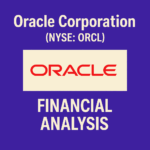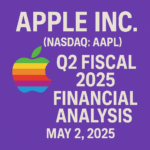NVIDIA Corporation (NASDAQ: NVDA)
Q1 Fiscal 2026 Financial Analysis | May 28, 2025
Executive Summary
NVIDIA delivered exceptional Q1 Fiscal 2026 results with revenue of $44.1 billion, up 69% year-over-year and 12% sequentially, driven by unprecedented demand for AI infrastructure. However, the quarter was significantly impacted by a $4.5 billion charge related to H20 excess inventory and purchase obligations following new U.S. export licensing requirements for China announced on April 9, 2025. Despite this headwind, NVIDIA demonstrated the strength of its AI platform with Data Center revenue reaching $39.1 billion and record Gaming revenue of $3.8 billion.
Key Impact: H20 Export Restrictions
On April 9, 2025, NVIDIA was informed by the U.S. government that a license is required for exports of H20 products to China. This resulted in a $4.5 billion inventory charge and an additional $2.5 billion in unshipped revenue, while H20 sales prior to restrictions were $4.6 billion for the quarter.
Q1 FY2026 Highlights
Financial Performance
NVIDIA’s Q1 FY2026 revenue reached $44.1 billion, representing remarkable 69% year-over-year growth and 12% sequential growth. This exceptional performance was driven by continued strong demand for the company’s AI computing platform across data centers, cloud service providers, and enterprises worldwide. The sequential growth demonstrates sustained momentum in AI infrastructure adoption.
GAAP gross margin was significantly impacted by the $4.5 billion H20 inventory charge, compressing margins to 60.5%. However, excluding this one-time impact, gross margin would have been 71.3%, demonstrating the underlying strength of NVIDIA’s product portfolio. The company expects to work toward achieving gross margins in the mid-70% range by late fiscal 2026.
Operating income increased 28% year-over-year to $21.6 billion, while net income grew 26% to $18.8 billion. GAAP diluted earnings per share reached $0.76, and would have been $0.96 excluding the H20 charge and related tax impact. These results highlight NVIDIA’s exceptional operational leverage and pricing power in AI markets.
The company generated $27.4 billion in operating cash flow, up from $15.3 billion in the prior year, demonstrating strong cash conversion and the capital-efficient nature of NVIDIA’s business model. Free cash flow reached $26.1 billion, providing substantial financial flexibility for continued investments and shareholder returns.
Business Segment Performance
| Segment | Q1 FY26 Revenue | YoY Change | Sequential Change | Key Drivers |
|---|---|---|---|---|
| Compute & Networking | $39.6B | +75% | +10% | AI infrastructure demand, Blackwell ramp |
| Graphics | $4.5B | +33% | +36% | Gaming RTX adoption, AI PC growth |
Compute & Networking delivered outstanding performance with revenue of $39.6 billion, up 75% year-over-year and 10% sequentially. This segment, primarily driven by Data Center revenue of $39.1 billion, benefited from explosive demand for large language models, recommendation engines, and generative AI applications. The Blackwell architecture ramp expanded across all customer categories, with cloud service providers representing just under 50% of Data Center revenue.
Within Compute & Networking, Data Center compute revenue reached $34.2 billion, up 76% year-over-year, while networking revenue hit $5.0 billion, up 56% year-over-year and 64% sequentially. The networking growth was driven by NVLink compute fabric adoption in GB200 systems and continued Ethernet adoption for AI solutions.
Graphics segment achieved record revenue of $4.5 billion, up 33% year-over-year and 36% sequentially. Gaming led this performance with $3.8 billion in revenue, driven by the fastest architecture ramp in company history with Blackwell GPUs. Professional Visualization contributed $509 million, up 19% year-over-year, driven by broader adoption of Ada RTX workstation GPUs.
Automotive revenue reached $567 million, up 72% year-over-year, driven by self-driving platform sales. While representing a smaller portion of total revenue, this segment demonstrates NVIDIA’s diversification into next-generation transportation technologies.
Market Platform Performance
| Platform | Q1 FY26 Revenue | YoY Change | Sequential Change | Market Position |
|---|---|---|---|---|
| Data Center | $39.1B | +73% | +10% | AI infrastructure leader |
| Gaming | $3.8B | +42% | +48% | Premium GPU market leader |
| Professional Visualization | $509M | +19% | 0% | Workstation GPU leader |
| Automotive | $567M | +72% | -1% | Autonomous driving platforms |
Data Center dominated NVIDIA’s revenue mix at 89% of total revenue, with $39.1 billion representing 73% year-over-year growth. This exceptional performance reflects NVIDIA’s position at the center of the AI revolution, with customers investing heavily in AI infrastructure. The platform serves large language models, recommendation engines, and the emerging agentic AI applications that require substantial computational power.
Gaming achieved record quarterly revenue of $3.8 billion, demonstrating the strength of NVIDIA’s consumer GPU franchise. The 48% sequential growth was driven by the successful launch of Blackwell architecture GPUs, which NVIDIA describes as the “fastest ramp in company history.” This performance validates the company’s strategy of bringing cutting-edge AI capabilities to consumer markets.
Professional Visualization showed steady growth at $509 million, up 19% year-over-year. The growth was driven by broader adoption of Ada RTX workstation GPUs for AI acceleration, real-time graphics rendering, and data simulation workloads. This segment benefits from the convergence of professional workflows with AI capabilities.
Automotive revenue increased 72% year-over-year to $567 million, driven by sales of self-driving platforms. While the sequential decline of 1% reflects normal quarterly variability, the strong year-over-year growth demonstrates progress in autonomous vehicle development and NVIDIA’s role in next-generation transportation.
Strategic Initiatives & Innovation
NVIDIA continued advancing its strategic position in AI infrastructure and emerging technologies through significant product launches and partnerships:
AI Infrastructure Expansion
- Blackwell Ultra and Dynamo: Introduced advanced architectures for accelerating AI reasoning models, addressing the growing demand for agentic AI applications
- Manufacturing Expansion: Announced plans to build factories in the U.S. and work with partners to produce AI supercomputers domestically
- Global AI Factories: Partnerships with HUMAIN in Saudi Arabia, Stargate UAE with G42/OpenAI/Oracle, and Foxconn in Taiwan demonstrate global infrastructure buildout
- Enterprise AI Solutions: Launched RTX PRO Servers and NVLink Fusion for industry to build semi-custom AI infrastructure
Gaming and Consumer AI
- GeForce RTX 5070/5060: Launched Blackwell graphics for gamers starting from $299 for desktops and $1,099 for laptops
- DLSS 4 Expansion: Now available in over 125 games, including major titles like Black Myth Wukong and Star Wars Outlaws
- Nintendo Switch 2: Powered by NVIDIA processor with AI-powered DLSS, delivering up to 4K gaming
- RTX Remix Platform: Attracted over 2 million gamers with modding capabilities
Robotics and Autonomous Systems
- Isaac GR00T: Launched world’s first open humanoid robot foundation model and development tools
- Automotive Partnerships: Collaboration with General Motors on next-generation vehicles and factories
- Safety Systems: Announced NVIDIA Halos unified safety system for automotive applications
- Physical AI: Released Cosmos world foundation models and data tools for robotics development
These initiatives demonstrate NVIDIA’s comprehensive approach to AI infrastructure, spanning from data center supercomputers to consumer devices and autonomous systems. The company’s ability to leverage its core GPU technology across multiple high-growth markets positions it well for sustained expansion.
Financial Position & Cash Management
NVIDIA maintained an exceptionally strong financial position with significant cash generation and strategic capital allocation:
Balance Sheet Strength
- Cash Position: $53.7 billion in cash, cash equivalents, and marketable securities, up from $31.4 billion a year ago
- Working Capital: Accounts receivable of $22.1 billion with improved 46-day DSO, down from 53 days sequentially
- Inventory Management: $11.3 billion inventory with 59-day DSI, including strategic capacity investments
- Supply Commitments: $29.8 billion in purchase commitments for inventory and manufacturing capacity
Cash Flow and Capital Allocation
- Operating Cash Flow: $27.4 billion, up from $15.3 billion year-over-year, driven by higher revenue and improved collections
- Free Cash Flow: $26.1 billion, demonstrating exceptional cash conversion and capital efficiency
- Share Repurchases: $14.1 billion in share buybacks, returning substantial capital to shareholders
- Dividends: Quarterly dividend of $0.01 per share, with next payment on July 3, 2025
Strategic Investments
- Cloud Services: $10.6 billion in multi-year cloud service agreements to support R&D and DGX Cloud offerings
- Capacity Expansion: $4.2 billion in supply and capacity prepayments to secure manufacturing
- R&D Infrastructure: Continued investments in compute infrastructure for product development
The company’s robust financial position provides substantial flexibility to invest in growth opportunities, navigate supply chain challenges, and return capital to shareholders while maintaining the resources needed to lead in AI infrastructure development.
Q2 Fiscal 2026 Outlook
NVIDIA provided the following guidance for Q2 FY2026:
- Revenue expected at $45.0 billion, plus or minus 2%, reflecting continued strong demand offset by H20 export limitations
- H20 revenue loss of approximately $8.0 billion due to export control restrictions
- GAAP and non-GAAP gross margins expected at 71.8% and 72.0% respectively
- Working toward mid-70% gross margins by late fiscal 2026
- GAAP operating expenses of approximately $5.7 billion, non-GAAP $4.0 billion
- Full-year fiscal 2026 operating expense growth expected in mid-30% range
- Tax rate expected at 16.5%, plus or minus 1%
The outlook reflects NVIDIA’s confidence in underlying AI demand growth despite the significant impact from H20 export restrictions. The sequential revenue growth guidance of approximately 2% demonstrates continued momentum in core Data Center and Gaming markets, while the margin expansion toward historical levels indicates successful navigation of the H20 inventory impact.
Management’s expectation of achieving mid-70% gross margins by late fiscal 2026 suggests confidence in product mix optimization and operational efficiency improvements as new product ramps mature and supply chain dynamics normalize.
Risks & Opportunities
Opportunities
Risks
Conclusion
Strengths
- Exceptional revenue growth of 69% year-over-year driven by AI demand
- Dominant position in AI infrastructure with expanding market opportunity
- Strong cash generation of $27.4 billion enabling strategic investments
- Successful product launches across Data Center, Gaming, and Automotive
- Robust balance sheet with $53.7 billion in cash and investments
Key Challenges
- Significant H20 inventory charge of $4.5 billion from export restrictions
- Gross margin compression due to geopolitical trade constraints
- Supply chain complexity managing unprecedented demand growth
- Regulatory uncertainty in key international markets
- Execution risk in scaling production to meet demand
Investment Summary
NVIDIA delivered outstanding Q1 FY2026 results that underscore its position at the center of the global AI transformation. Revenue of $44.1 billion represents 69% year-over-year growth, driven by exceptional demand for AI infrastructure across data centers, cloud providers, and enterprises worldwide.
While the $4.5 billion H20 inventory charge related to China export restrictions created near-term margin pressure, it does not diminish the underlying strength of NVIDIA’s AI franchise. The company’s core Data Center business grew 73% year-over-year to $39.1 billion, demonstrating sustained momentum in AI adoption that extends far beyond any single geographic market.
NVIDIA’s strategic initiatives across AI infrastructure, gaming, robotics, and autonomous systems position the company to capitalize on multiple high-growth technology trends. The successful Blackwell architecture launch, expansion of AI factories globally, and development of next-generation platforms for agentic AI applications highlight the company’s innovation leadership.
With exceptional cash generation of $27.4 billion from operations, a strong balance sheet, and guidance for continued growth in Q2 FY2026, NVIDIA remains well-positioned to navigate geopolitical challenges while capitalizing on the multi-year AI infrastructure buildout cycle. The company’s ability to drive technological innovation across diverse markets makes it a compelling long-term investment in the AI-driven future of computing.




